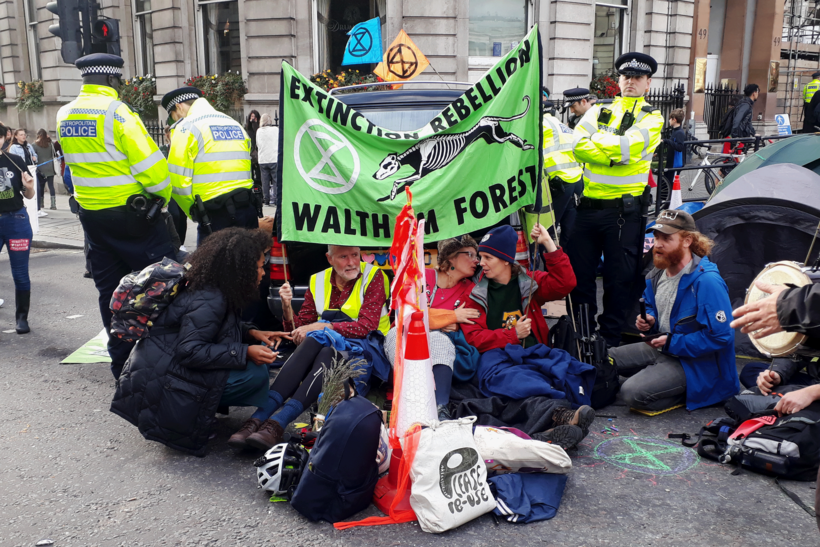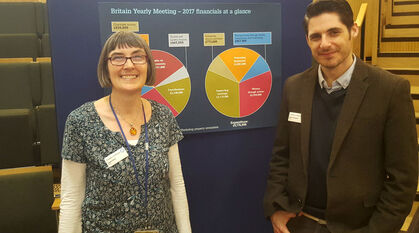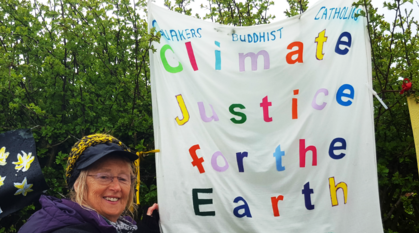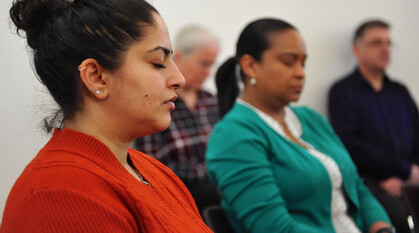What’s wrong with Prevent?
Prevent fostered racism before police labelled Extinction Rebellion as extremists. Quakers are joining voices raised in opposition to the government's counter-terrorism strategy.

Prevent is the UK government's programme to stop people becoming terrorists or supporting terrorism. It has hit the headlines many times since its 2003 inception, and did so again in January when The Guardian revealed that police in South East England had listed Extinction Rebellion (XR) among 'extremist' ideologies, placing it alongside the far-right National Action and Islamic State affiliate Al-Muhajiroun.
Campaign Against Arms Trade and the Campaign for Nuclear Disarmament, which both have strong Quaker links, have also been listed in police counter-terrorism guides, expanding the definition of extremism to nonviolent protest.
That's alarming for democracy, but as an attempt to tackle so-called 'violent extremism', Prevent had already proved to be impossible to implement without ill-informed bias, Islamophobia and racism.
Across civil society, Prevent has been described as a 'toxic brand', 'dubious', 'chilling', 'misconceived', spreading 'fear and distrust' and 'built on a foundation of Islamophobia'. Data shows Muslims have been disproportionately targeted.
Quakers hold tackling the roots of violence to be essential, but in our experience Prevent doesn't do that. Rather, it results in racism and Islamophobia, causing society to become more divided. It conflates nonviolent dissent with extremism.
The Quaker faith is founded on a dissenting tradition that promotes religious freedom, and this history informs our view on Prevent. In 2019 Quakers in Britain responded to a long-awaited independent inquiry into Prevent, but when the inquiry's impartiality was challenged, the Home Office then delayed the review. We'll make a new submission when the independent review relaunches, but you can read our critique of Prevent here (PDF).
We are now dismayed to see peaceful protests and campaigns being identified and potentially criminalised by this legislation.
The trouble with Prevent
The 'Prevent duty', introduced in 2015, required teachers, nurses and other publicly-funded professionals to report suspicions of extremism, which may be referred to the police. Educators have been given confusing and difficult to implement advice, such as treating a change in religion as a sign of extremism.
Quakers are among many who have raised fears that it has exacerbated racism and marginalisation, particularly for young Muslims. Quaker staff have taken our concerns to the Home Office in person and we raised them with the United Nations Committee on the Rights of the Child in 2016 (PDF).
Prevent has led to troubling incidents. Several years ago Michael Davies, a Quaker teacher, was in the audience for a Prevent presentation which put the 'George Fox 6' anti-arms trade campaigners in a collage of 'extremist groups'. Michael protested vigorously. I wonder whether a Muslim teacher could speak up in the same situation without fear?
Other examples include a Prevent officer visiting a family home without prior notice to investigate what a six year-old child said to a peer on a school trip, only to find it was recitation of something from the Horrible Histories kids TV programme. Or when a protester was reported to the authorities and told he would be prevented from nonviolently protesting the war in Iraq.
[QUOTE-START]
The Prevent policy is about challenging extremism, but perhaps that makes it more important than ever to be what Martin Luther King called "extremists for love".
[QUOTE-END]
Any good government should see the safety and security of people as paramount, and many involved in creating Prevent are surely driven by that, but this kind of intervention is, at best, counterproductive.
With counter-terrorist police looking explicitly at climate and peace campaigners as threats, it is a frightening time to be both Muslim and an activist. Prevent confuses religious practice with criminal behaviour. It damages democratic participation and undermines education. It precludes honest discussion and debate about what drives criminal violent behaviour. For some, Prevent is a cause of fear, pain and anger. We also want Prevent to be seen honestly in the context of a violent UK foreign policy.
What now?
While it was positive that the government promised an independent review, it was disappointing to find that the terms of reference were restrictive and seemed skewed to forestall criticism. Feedback on Prevent's historic record was not wanted; only suggestions for ways to improve in future. It was roughly equivalent to writing a film review based solely on a trailer for the sequel.
Following criticism and a legal challenge from Rights Watch UK, the Home Office suspended the review, and Prevent is still in force. Quakers in Britain are poised to resubmit when the Home Office relaunches the review, hopefully with stronger terms of reference.
If you have concerns about Prevent, you will be able to submit a response yourself. Quakers with experience of Prevent can email Grace Da Costa, our Public Affairs and Advocacy Manager, with your feedback, which we can integrate into our review.
Prevent can be seen as one part of broader state racism including the 'hostile environment', militarism and an uncaring asylum system. In your community, you could have a role in challenging racism. You may have it in your power to bridge division or show solidarity with marginalised people. This might be through interfaith through groups like the Christian Muslim Forum of the Interfaith Network or challenging racism through the Sanctuary Everywhere Programme.
Find out more
If you'd like to know more about the impact of the Prevent Strategy, make use of existing expertise:
- Prevent Watch has supported hundreds of people impacted by Prevent.
- CAGE is a leading organisation tackling the injustices resulting from counter-terrorism policies, and they are preparing a strong critique, proposing better ways to rebuild society. .
- Rights Watch UK launched the judicial challenge to the Prevent review, and have done detailed research on the impact in education (PDF).
- And moving beyond Prevent, we also need to engage with what makes us truly secure. Check out Rethinking Security to learn about how Quakers and others are articulating that vision.


